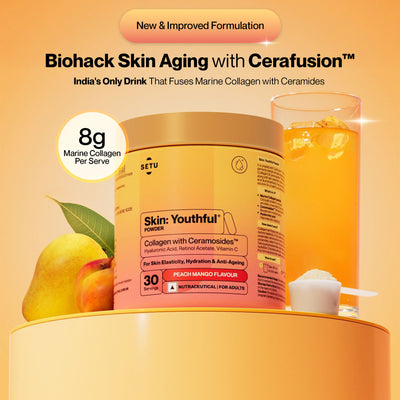Glutathione: Does it Really Live Up to the Hype?
15 Mar 2024
Introduction to Glutathione
Glutathione is a powerful antioxidant that's found naturally in the cells of your body. It plays several vital roles, including protecting your cells from oxidative stress, detoxifying your body of harmful compounds, supporting immunity, and keeping your skin healthy.
Often referred to as the “master antioxidant,” glutathione contains three key amino acids - cysteine, glycine, and glutamic acid. This tripeptide is synthesized inside the cells and does not come directly from the diet, although certain foods and nutrients are needed as precursors for its production.
Glutathione has gained popularity in recent years due to emerging research on its many purported benefits. It has been widely used as a supplement, especially by people looking to slow aging, boost immunity, and achieve healthier skin.
Proponents claim that increasing glutathione levels can provide protection against numerous health conditions, like cancer, heart disease, and autoimmune disorders. However, while evidence does suggest glutathione has important protective roles within the body, there’s still a lack of definitive research on the benefits of glutathione supplementation for such disorders.
Today, we’re looking at it’s key science-backed benefits and its powerful role in skincare.
Glutathione as an Antioxidant
Glutathione is the most abundant and important antioxidant in the human body. It plays a crucial role in fighting oxidative stress and protecting cells from damage caused by free radicals and reactive oxygen species.
Oxidative stress occurs when there is an imbalance between free radicals and antioxidants in the body. Free radicals are unstable molecules that can damage proteins, lipids, and DNA inside cells through a process called oxidation. This kind of damage has been linked to the development of cancer, heart disease, neurodegenerative diseases, and the aging process.
Glutathione neutralizes free radicals by donating an electron to stabilize them. This prevents free radicals from causing oxidative damage to important cellular components. Glutathione also regenerates and recycles other antioxidants like vitamins C and E back to their active forms after they have neutralized free radicals.
Glutathione and Immunity
Glutathione plays an important role in maintaining a healthy immune system. Our immune cells rely on glutathione to perform their normal functions.
Research studies have shown that higher glutathione levels are associated with enhanced T-cell activity. T-cells are a type of white blood cell that destroy infection-causing pathogens and cancer cells. Individuals with higher glutathione also tend to mount stronger antibody responses to vaccines and infections.
Some studies suggest that declining glutathione levels are partly to blame for weakened immunity as we age. Elderly people often have lower glutathione levels as well as a reduced functional immune response.
Glutathione may help counter inflammation. Chronic inflammation is now believed to underlie many diseases. Some studies indicate glutathione inhibits certain pro-inflammatory cytokines that can overreact and cause damage.
Glutathione and Detoxification
One of the major roles of glutathione is to help the liver detoxify chemicals and pollutants. The liver is the main organ responsible for detoxification. It processes toxins and chemicals and helps excrete them from the body through urine and bile.
Glutathione is crucial for liver health and its detoxification processes. The liver depends on adequate levels of glutathione to function properly. Glutathione helps bind to free radicals and toxins in the liver, making them less harmful. It also helps convert toxins into compounds that can be safely excreted from the body.
Some of the harmful substances detoxified by glutathione include alcohol, drugs, heavy metals, air pollutants, and chemicals. As these toxins build up in the body over time, the demand for glutathione increases. Without enough glutathione, toxins can accumulate in the liver and cause damage.
Glutathione is specifically important for a process called phase II liver detoxification. In this process, glutathione binds to fat-soluble toxins after they have been processed by other enzymes. This makes the toxins water-soluble so they can be excreted in bile or urine. The body's ability to produce glutathione declines with age. This can impair detoxification and allow toxins to accumulate.
Glutathione and Skin Health
By detoxifying your liver, glutathione has powerful benefits for your skin. Some of the scientific evidence behind glutathione's purported benefits suggest that the liver-skin axis is crucial, and that a strong liver supports healthy, radiant skin. Glutathione is also promoted as a powerful anti-aging antioxidant for the skin. Its purported benefits include:
- Protecting against damage from UV radiation and pollution
Glutathione may help reduce oxidative stress and inflammation caused by sun exposure and environmental toxins. This helps slow visible signs of aging.
- Reducing hyperpigmentation and evening out skin tone
By inhibiting melanin production, glutathione may help fade age spots, acne scars, and other areas of pigmentation.
- Hydrating and nourishing your skin
Glutathione helps the skin retain moisture and improves skin cell renewal. This gives the skin a more youthful, hydrated appearance.
- Neutralizing free radicals
As a potent antioxidant, glutathione can help counteract wrinkle-causing free radicals that damage skin cells and collagen. This may slow fine lines, sagging, and other aging effects.
- Boosting collagen synthesis
Some research shows glutathione can support collagen production and protect existing collagen, increasing skin elasticity and firmness.
- Decreasing inflammation
Glutathione helps regulate inflammatory response in the skin. This can calm redness and sensitivity while reversing inflammatory damage.
Overall, glutathione has promising anti-aging and skin-rejuvenating effects due to its antioxidant and anti-inflammatory properties.
Raising Glutathione Levels Naturally
Glutathione levels can be increased with the help of the right diet, exercise, and lifestyle changes. Scientific evidence behind glutathione's purported benefits offer direction in the ways to raise your glutathione levels naturally:
- Eat sulfur-rich foods
Sulfur is needed to synthesize glutathione. Foods high in sulfur include garlic, onions, broccoli, kale, cabbage, Brussels sprouts, and eggs.
- Consume more vitamin C
Vitamin C is required for glutathione synthesis. Citrus fruits, bell peppers, dark leafy greens, kiwi, berries, papaya, and tomatoes are great sources.
- Increase cysteine intake
Cysteine is one of the amino acids needed to make glutathione. Foods high in cysteine include chicken, turkey, yogurt, eggs, sunflower seeds, and whey protein.
- Exercise regularly
Regular exercise has been shown to increase glutathione levels. Aim for 30-60 minutes of exercise like walking, jogging, or strength training most days.
- Get adequate sleep
Not getting enough sleep can lower glutathione levels. Adults should aim for 7-9 hours of sleep per night.
- Reduce alcohol intake
Chronic alcohol consumption can deplete glutathione. Limit alcohol to 1 drink per day for women and 2 for men.
- Manage stress levels
Chronic stress increases oxidative stress and glutathione demand. Try yoga, meditation, deep breathing, and other stress-relieving practices.
- Avoid pollutants and toxins
Cigarette smoke, air pollution, pesticides, cleaners, and other chemicals deplete glutathione. Minimize exposure when possible.
Increasing glutathione levels through natural means like diet and lifestyle can provide antioxidant, detoxification, and immune-boosting benefits. Consult a doctor before taking glutathione supplements.
Glutathione Supplements
There are a few different types of glutathione supplements available on the market. Glutathione itself is not well absorbed orally, so most supplements aim to increase glutathione levels indirectly. An easy way to incorporate Glutathione into your skin care routine is by incorporating a powerful, science-backed Glutathione formula into your diet, such as Setu Skin: Renew – Glutathione. This contains Vitamin C for higher absorption and added skin-boosting benefits.
Taking a high-quality glutathione precursor supplement like NAC is likely the most effective and affordable way to increase glutathione levels. Getting glutathione through diet by eating sulfur-rich foods may also help maintain healthy levels. Consult a healthcare provider before taking any new supplements, especially IV therapies. More human studies are still needed to understand the impact of various glutathione supplements on health and disease prevention.
Scientific Evidence Behind Glutathione's Purported Benefits
Glutathione is one of the most widely studied antioxidants and molecules in the human body. Here is an overview of some of the key scientific research on the benefits of glutathione:
- Several studies have shown that glutathione helps protect cells from oxidative stress and free radical damage. This antioxidant effect likely underlies many of glutathione's health benefits. Some research indicates glutathione may help defend against chronic conditions like heart disease, cancer, and neurodegenerative diseases.
- Multiple clinical trials demonstrate glutathione boosts immunity by enhancing the function of lymphocytes and natural killer cells. This helps the body fight infections and illnesses.
- Glutathione is critical for liver detoxification. Studies show it helps the liver neutralize toxins, drugs, pollutants, and other harmful compounds. This detox role of glutathione may be responsible for some of its purported benefits.
- Glutathione has been shown to improve moisture, lighten hyperpigmentation, and enhance overall skin appearance. Oral glutathione supplements may also support skin health through whole-body antioxidant effects.
Conclusion
Glutathione has certainly gained a reputation as a cure-all super supplement in recent years, with claims around everything from slowing aging and boosting immunity to improving skin and detoxification. The benefits of glutathione for immunity and antioxidant activity are quite well established, and the scientific backing for these roles is substantial.
At the end of the day, glutathione is an important antioxidant our bodies produce naturally that likely provides numerous health benefits when levels are optimized. Raising glutathione levels through diet, lifestyle habits, and supplementation makes sense for overall wellness.
However, the notion that a glutathione supplement will act as a magic cure-all to drastically improve health and slow aging is incorrect – we need to make wholistic changes to see real results in our daily lives.
Skin: Renew - Glutathione - Orange Flavour
- ₹1,994
- ₹1,994
-
₹2,600 - ( 23% OFF)
Categories
- Choosing a selection results in a full page refresh.
- Press the space key then arrow keys to make a selection.
this is the sidecart
















